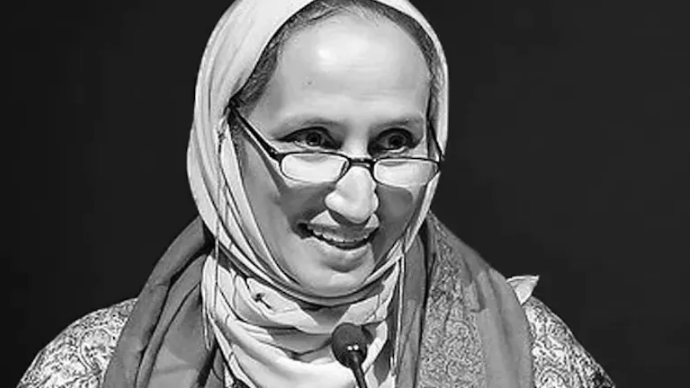'Literature could bring India and Arabic world closer' says first Indian chosen for Sheikh Zayed Book award
'Literature could bring India and Arabic world closer' says first Indian chosen for Sheikh Zayed Book awardon Apr 30, 2021

Who is Dr. Tahera Qutbuddin?
A professor of Arabic Literature at the University of Chicago, Qutbuddin also serves on the editorial board of Abu Dhabi’s Library of Arabic Literature. Her award-winning book was released by Brill Academic Publishers of Leiden in 2019. Her research focuses on intersections of the literary, the religious and the political in classical Arabic poetry and prose.Q. What is your feeling on being chosen for the prestigious award?
A. I am delighted and honored. I appreciate the sincere efforts of the UAE to build bridges of intellectual and cultural exchange between the Arabic-speaking world and the rest of the globe. The award is one that I am truly pleased to be affiliated with, and it is the first time they have awarded an Indian scholar. Orations—the powerful, rhythmic, and vibrantly visual speeches and sermons of the Arabs and early Muslims—are among their brilliant cultural achievements, and the mother of all later Arabic prose. They are also a dynamic repository of their people’s lived lives—of their religion, politics, law, governance, theology, and social interactions. I am pleased that this award will bring these hidden gems to greater light among scholars of Arabic Literature and Islamic History in the West, the Middle East, and hopefully in India as well.Q. What are your memories of Mumbai?
A. I was born and grew up in Mumbai. I have lived in Egypt and now in the United States for many decades now, and I have gained much from those places, but my roots are vital to who I am. Indian culture is part of the fabric of my being. It is the place of my childhood memories, of playing in the monsoon rains and eating mangoes in the summer. I come back to Mumbai often. I love my Mother India, and pray for her security and progress, and for harmony and love between the many beautiful communities that call her home.Q. What transformations the Arabic literature has witnessed in recent times?
A. Arabic literature spans 15 centuries and many continents. It all started in the Arabian Peninsula in the 7th century with the cadenced orations and powerful poetry of the semi-nomadic Arabs. Arabic literature has always influenced other cultures—some say the translations made by 10th century scholars of ancient Greek wisdom into Arabic, which were then translated in Spain into the local Romance languages there, sparked the European Renaissance in the 14th century. In the past 200 years, the imported literary forms of the novel and free verse have taken root in the Middle East, and Arabic writers have combined these with their own heritage to produce visceral poems and sophisticated novels that give insight into their reality on the ground and their hopes and their dreams. The Nobel-prize winning Egyptian author Naguib Mahfouz is well known worldwide.Q. What is your opinion on the relations between India and the Arabic world?
A. Arabic-speaking countries and India have had personal and cultural exchanges that go back almost two millennia, and today’s greatly mobile world, there is ever more increasing contact. One of the most important things to improve relationships between two groups of people in my view is to understand each other’s culture, which highlights unique characteristics, but also common human goals, and a wonderful way to do this is by reading their literature.Q. How India is portrayed in Arabic literature?
A. India is portrayed in Arabic literature as a land of rich culture, ancient wisdom, and wondrous beauty. Maulana Ali who was the Prophet Muhammad’s cousin and son-in-law, the first Shia Imam, the fourth Sunni caliph, and the acclaimed sage and orator of Islam praised India in one of his pithy sayings saying, “Indian earth is the world’s most fragrant!” The 10th century Iraqi litterateur and judge, Tanukhi, spilled much ink on the Indian elephant which he found truly fascinating. The 11th century polymath and mathematician from Khwarazm, Biruni, is also hailed by some as the father of Indology. His Trkh al-Hind (History of India) is a remarkably detailed study of Indian culture and the Hindu faith. Many of the classics of the Indian Vedic tradition were translated in India into Arabic (and Persian) during medieval times, including the Mahabharata and the Hathagoya, a work on bodily and spiritual discipline. Today, India’s national poet Rabindranath Tagore, among other major Indian thinkers, has been translated into Arabic and is read and appreciated in the Middle East Source: IndiaToday
Arabic literature and India-Arab relations.
Books
Dr. Tahera Qutbuddin
Frontlist
Frontlist India
Frontlist India news
Frontlist Latest
Frontlist Latest news
Frontlist Latest Update
Frontlist News
the first Indian chosen for the prestigious Sheikh



.jpg)






.jpg)

.jpg)
.jpg)
.jpg)
.jpg)
.jpg)










Sorry! No comment found for this post.